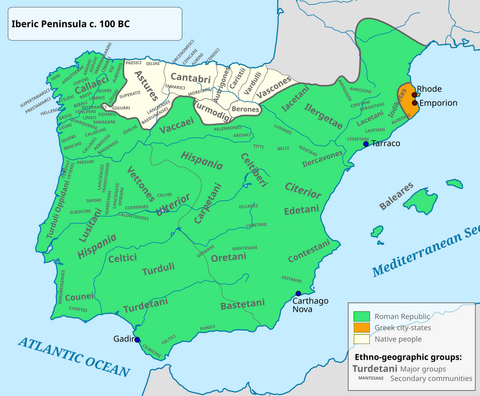| Nations | Period of existence in the Peninsula |
|---|---|
| Greek colonies | 575 BC - 45 BC |
| Roman Republic | 218 BC - 27 BC |
| Wars | Duration |
|---|---|
| Lusitanian War | 155 BC - 139 BC |
| 2nd Celtiberian War (1st Numantine War) | 154 BC - 152 BC |
| 3rd Celtiberian War (2nd Numantine War) | 143 BC - 133 BC |
155 BC
- Under the command of Punicus first and Cesarus after, the Lusitanians and Vettones reach Gibraltar. There they are defeated by the Praetor Lucius Mummius. Beginning of the Lusitanian War.
154 BC
- Lusitanians, under Cesarus, pillage through Baetica (modern Andalusia).
- Rome forbid the enlargement of the fortification of Segeda, capital of the Belli, considering an infraction to the treaty with Gracchus in 179 BC. However, the Belli continue the enlargement. Beginning of the 2nd Celtiberian War.
153 BC
- With the advance of the roman legions led by the Consul Quintus Fulvius Nobilior, the inhabitants of Segeda take refuge in Numantia, a city of the Arevaci tribe.
- Nobilior destroys the city of Segeda, takes Ocilis (Medinaceli), but is ambushed by the Belli General Caros, leader of the Celtiberian coalition, at the battle of Ribarroya, at the Baldano river valley.
- Nobilior arrives at the city of Numantia, where he spend the winter without taken it.
152 BC
- Marcus Claudius Marcellus replaces Nobilior as Consul and takes the Celtiberian cities of Ocilis and Nertobriga. Entrapped, the Numantines surrender. End of the 2nd Celtiberian war.
147 BC
- Viriathus is acclaimed leader of the Lusitanians.
143 BC
- Viriathus form a league against Rome with several Celtic tribes. The Arevaci are one of these tribes, beginning the second phase of the Numantine War.
- The governor Quintus Caecilius Metellus Macedonicus attacks the territory of the Vettones, but is not able to take the cities of Numantia and Termancia.
142 BC
- Fabius Servilianus, new Consul of Hispania Ulterior, after having sacked several cities loyal to Viriathus in Baetica and southern Lusitania, is defeated by the Lusitanians in Erisane (in Baetica).
- Fabius Servilianus, after the defeat, declare Viriathus to be a Friend of the Rome.
141 BC
- After suffering severe defeats, the general Quintus Pompeius secretly negotiate a peace with the city of Numantia.
140 BC
- In Hispania Ulterior, Servilius Cipianus, with the aid of Marcus Popillius Laenas' armies, severely defeat the Lusitanians and oblige Viriathus to take refuge north of the Tagus river.
- Servilius Cipianus armies also attack the Vettones and the Gallaecians.
139 BC
- The Roman Senate deems Fabius Servilianus' actions unworthy of Rome, and sends Servilius Cipianus to defeat the rebellious tribes of Hispania.
- Servilius Cipianus founds the Roman cities of Castra Servilia and Caepiana (in the territory of the Celtici).
- Viriathus send emissaries to negotiate the peace with Servilius Cipianus, but is betrayed and killed in his sleep by his companions, bribed by Marcus Popillius Laenas.
- Lusitanian armies, now led by Tautalus, still tries a southern incursion against the Romans, but are defeated. End of the Lusitanian War.
138 BC
- The general Marcus Popillius Laenas don't recognize the peace treaty of 141 BC signed between Quintus Pompeius and the Arevaci, beginning the final phase of the Numantine War.
137 BC
- Gaius Hostilius Mancinus assault the city of Numantia, but is repulsed several times before being routed and encircled, and so forced to accept a treaty. However, the Roman Senate don't ratify this treaty.
136 BC
- After crossing the rivers Douro and Minho, Decimus Junius Brutus lays siege and conquers the city of Talabriga, thus defeating the Gallaecians. After the military campaigns, the Roman legions depart south and leave no garrisons.
134 BC
- The Consul Scipio Aemilianus is sent to Hispania Citerior to end the war against the city of Numantia.
133 BC
- Scipio builds a ring of seven fortresses around Numantia itself before beginning the siege proper. After suffering pestilence and famine, most of the surviving Numantines commit suicide rather than surrender to Rome. End of the Numantine War and the Celtiberian Wars.
123 BC
- The Balearic Islands are conquered by Q. Caecilius Metellus, thence surnamed Balearicus. Metellus settle 3,000 Roman and Spanish colonists on the island of Majorca, founding the cities of Palma and Pollentia.
105 BC
- After the Battle of Arausio, the Germanic Teutons and Cimbri plunder through all north Iberia as far as Gallaecia.
102 BC
- The Germanic Teutons and Cimbri move out of Iberia to attack the Romans in their native territory in Gaul, where they are defeated in the battles of Aquae Sextiae and Vercellae.





